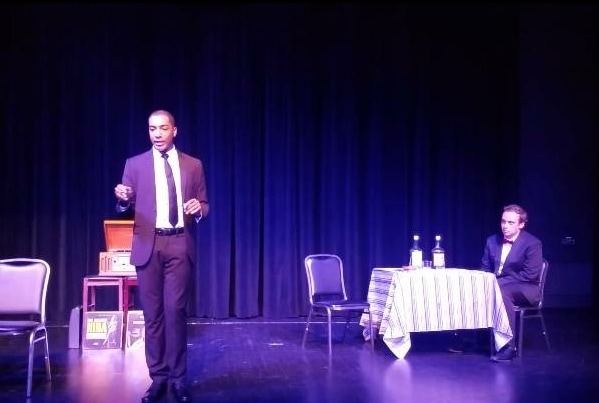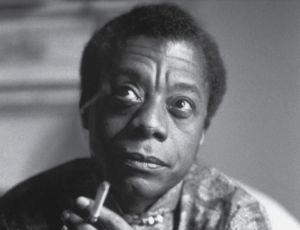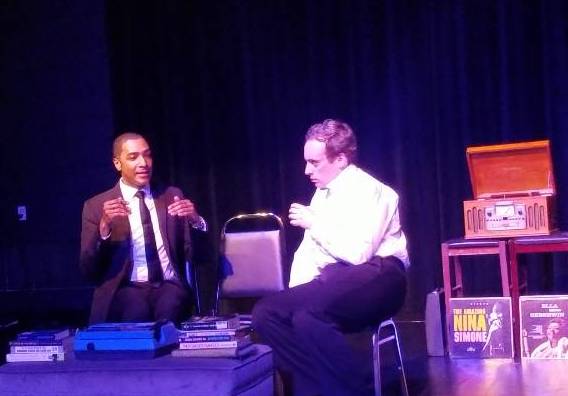With the recent release of I Am Not Your Negro and If Beale Street Could Talk, the eminent writer James Baldwin received significant cinematic attention. This has been followed in DC by two provocative portraits on stage: Psalmayene 24’s Les Deux Noirs: Notes on Notes of a Native Son, seen last April at Mosaic, and Reginald T. Jackson’s Baldwin’s Nigger, seen last weekend in the DC Black Theatre & Arts Festival. Now more than ever, Baldwin’s important voice needs to be heard, and Writer/Director Jackson gives us much to listen to in this captivating bio-play.
We meet Baldwin as a young man, already an acclaimed author. There is a record player in the room, some LPs (Nina Simone, Ella Fitzgerald), some books, a typewriter, and a table with two glasses and two large liquor bottles, which are full for now. Baldwin has invited home another homosexual young man, Ezra, who is white and Jewish. But this is no ordinary pickup. Ezra has come on behalf of several wealthy white donors who want to support the Civil Rights Movement but are reluctant to do so visibly. Ezra wants to get to know “Mr. Baldwin” (as he calls him)—very intimately, it turns out—and in exchange, Ezra offers to write him a million-dollar check for the cause right then and there.
“Call me Jimmy,” says Baldwin, warmly but warily.
Jimmy proposes they play a game, “a variant of strip poker.” For each of Ezra’s questions that Jimmy answers truthfully, Ezra is to write another zero on the check. Deal.

The tension between the two—political, racial, sexual—is palpable from the beginning. Sentell Harper as Jimmy captured with uncanny verisimilitude the cadence of Baldwin’s speech, the grace of his body language, the glint of his darting eyes, the charm of his impish smile. Harper’s fine performance was almost a channeling. Sean Mannix as the fictional Ezra conveyed very persuasively the character’s abject emotional neediness, but his reliance on a cartoonishly broad New Joisey accent seemed unnecessary to the play.

Once Ezra begins peppering Jimmy with questions, it becomes apparent that Jackson’s script borrows ingeniously and extensively from Baldwin’s actual words—which are inimitably eloquent. There’s a passage at the beginning, for instance, that is pretty much verbatim from a speech Baldwin gave in England in the 1960s that was documented in the 1968 film Baldwin’s Nigger. (That film’s title refers explicitly to Baldwin’s discussion about his forebears’ life as the property of a slaveowner named Baldwin. Jackson adopts the title for a different but also unsettling purpose, which would be a spoiler to reveal.)
In the course of Jimmy’s answers to Ezra’s often impertinent questions, we get an amazingly rich glimpse into Baldwin’s life story—his upbringing in Harlem, his precocious preaching in a Pentecostal church as a teenager, his male and female lovers, his mentors and saviors, his writing career and political views.
Why do you call yourself a Negro?
…
Is it true you were molested as a child?
…
Who was Grace, the woman you almost married?
…
Is Rufus in Another Country, who committed suicide by jumping off the George Washington Bridge, modeled on Eugene Worth, the friend you loved who did the same?
And the Baldwin texts Jackson artfully incorporates comprise a wealth of wit and wisdom:
I don’t believe in race. I don’t believe in color.
To live free, you have to get free of labels.
…
Oppression keeps you thinking small.
Though the setting suggests the 1960s, the script itself time-travels, as in this striking passage from Baldwin’s trenchant takedown of masculinity, published in 1985 in Playboy of all places:
The American ideal of sexuality appears to be rooted in the American ideal of
masculinity. This ideal has created cowboys and Indians, good guys and bad guys, punks and studs, tough guys and softies, butch and faggot, black and white. It is an ideal so paralytically infantile that it is virtually forbidden — as an unpatriotic act — that the American boy evolve into the complexity of manhood.

There’s a smidgen of humor in the byplay between Jimmy and Ezra. “I’m pouring out my heart,” says Jimmy, tapping the table mock-scoldingly, “now get out your checkbook.” And Jimmy watches closely as Ezra enters each successive zero on the check. But there’s a far more serious undercurrent because from the beginning the two are playing a potent game of who’s using whom. Jimmy, in his trim sharp suit, smokes and drinks and maintains his erudition and self-possession throughout. Ezra meanwhile gets sloppy drunk, makes clear he wants to have sex with Jimmy, and steadily undresses. Jackson’s culmination of this creepy story arc is a shocker.
Ultimately, though, what makes Baldwin’s Nigger such a rewarding theatrical experience is not this sensational twist but the adroit way the play as a whole teleports to us the brilliance of James Baldwin. For this much credit is due to both Reginald T. Jackson’s engrossing script and Sentell Harper’s impressive impersonation.
Running Time: About 80 minutes with no intermission.
Baldwin’s Nigger played June 22 and 23, 2019, at THEARC Blackbox – 1801 Mississippi Ave SE, Washington, DC, as part of the 2019 DC Black Theatre & Arts Festival.
RELATED:
Opening Weekend at the DC Black Theatre & Arts Festival (Photo Feature) by Malcolm Lewis Barnes




